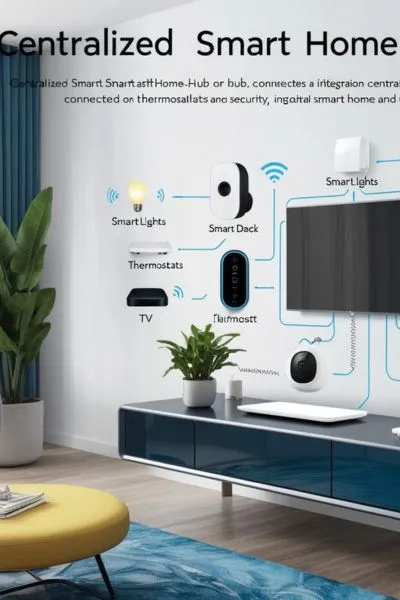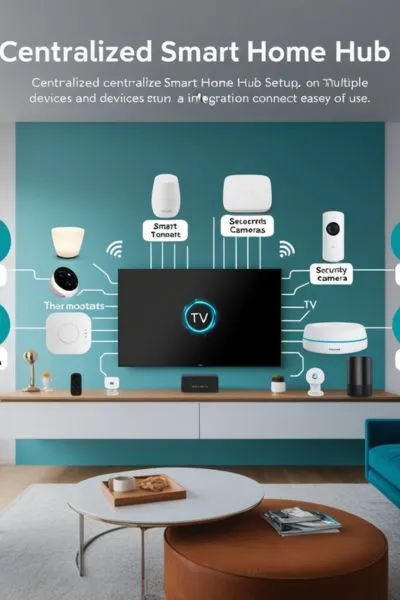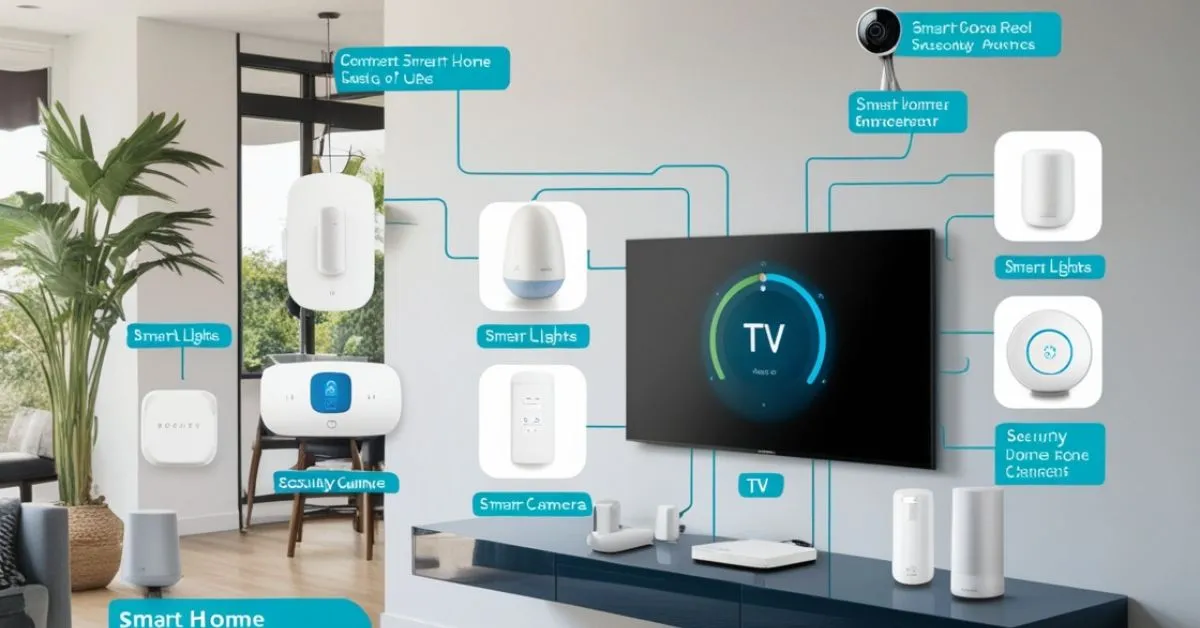Best Multi-device Smart Home Hubs

|
SMART HOME HUB (pillar blog) Related Blog |
|
1.Best Smart Home Hubs 2025 |
|
2.Best Smart Home Hubs Alexa |
|
3.Best Smart Home Hubs for Google Home Users |
|
4.Best Smart Home Hub Homekit |
|
5.Best Multi-device Smart Home Hubs |
|
6.Best Understanding Zigbee Zwave |
|
7.Best Budget Smart Home Hubs for 2025 |
|
8.10 Smart Home Automation Ideas for Every Home |
|
9.AI-Powered Smart Home Hubs 10.Smart Home Hubs: Common Issues, Solutions, and Optimization Tips |
Best Multi-Device Smart Home Hubs: What You Need to Know
Introduction
In today’s interconnected world, smart home technology has become an essential part of modern living. From controlling lights and thermostats to enhancing security, smart home devices simplify daily tasks and improve quality of life. However, managing multiple devices from different manufacturers can be a logistical challenge. That’s where multi-device smart home hubs come into play. These innovative tools act as central command centers, seamlessly integrating various devices into one unified ecosystem. For startups and small businesses, leveraging these hubs can streamline operations, reduce energy costs, and improve overall efficiency. With the smart home industry projected to surpass $150 billion by 2025, understanding the best multi-device smart home hubs and how to use them effectively has never been more important. In this guide, we’ll explore top smart home hubs, their benefits for businesses, and practical advice for choosing affordable, reliable tools. Whether you’re an entrepreneur or a tech-savvy homeowner, this blog will provide the insights you need to make informed decisions.
What Are Multi-Device Smart Home Hubs?
Multi-device smart home hubs are centralized systems designed to integrate and control various smart devices, regardless of their brand or communication protocol. They serve as a bridge, enabling compatibility between devices that might not otherwise work together. Popular communication protocols supported by these hubs include Wi-Fi, Zigbee, Z-Wave, and Bluetooth.
Key Features of Smart Home Hubs
- Device Compatibility:Numerous device types.
- Automation: Ability to set up custom routines and schedules.
- Voice Control: compatibility with voice assistants such as Siri, Google Assistant, and Alexa.
- Remote Access: Control devices from anywhere using mobile apps.
- Energy Monitoring: Track energy consumption for improved efficiency.
Why Startups and Small Businesses Should Care
For startups and small businesses, smart home hubs offer more than just convenience; they provide opportunities for cost savings, enhanced security, and operational efficiency.
Benefits for Businesses
- Energy Efficiency: Automating lighting and HVAC systems can reduce energy bills by up to 30%, according to the U.S. Department of Energy.
- Improved Security: Hubs can integrate with smart locks, cameras, and alarms to ensure a secure workspace.
- Enhanced Productivity: Automating repetitive tasks allows employees to focus on core business activities.
- Scalability: As businesses grow, smart hubs can easily accommodate additional devices and systems.
Example: A co-working space in Chicago used a multi-device smart home hub to automate lighting and room bookings. This reduced energy costs by 25% and streamlined operations, resulting in a better experience for tenants.
Top Multi-Device Smart Home Hubs in 2025
Here’s a roundup of the best smart home hubs available, their standout features, and pricing.
1. Samsung SmartThings Hub
- Features: Wide device compatibility, robust automation capabilities, and integration with major voice assistants.
- Best For: Businesses looking for a scalable solution.
- Price: ~$125
2. Amazon Echo (4th Gen)
- Features: Built-in Zigbee hub, excellent voice control, and seamless integration with Alexa.
- Best For: Small offices seeking affordable automation.
- Price: ~$99
3. Hubitat Elevation
- Features: Local control (no reliance on the cloud), high customization, and strong privacy features.
- Best For: Startups prioritizing data security.
- Price: ~$149
4. Apple HomePod Mini
- Features: Tight integration with the Apple ecosystem, advanced sound quality, and Siri support.
- Best For: Apple-centric environments.
- Price: ~$99
5. Google Nest Hub Max
- Features: Excellent display for monitoring, strong AI-powered suggestions, and Google Assistant integration.
- Best For: Businesses that rely on Google Workspace.
- Price: ~$229
How to Choose the Right Smart Home Hub
Selecting the ideal hub depends on several factors, including budget, compatibility, and specific business needs. Here are actionable steps to guide your decision:
1. Identify Your Needs
Determine what you want to achieve. Are you looking for energy savings, enhanced security, or improved workflow automation?
2. Check Device Compatibility
Make a list of existing and planned smart devices. Ensure the hub supports these devices and communication protocols.
3. Consider Scalability
Choose a hub that can grow with your business. Ensure it can accommodate additional devices as your needs evolve.
4. Evaluate User Experience
Look for hubs with intuitive interfaces and robust customer support. Reading reviews can help gauge user satisfaction.
5. Prioritize Security
Ensure the hub has robust security features, such as encryption and local control options.
Real-Life Applications
Case Study 1: A Retail Store
A boutique clothing store in Austin installed a Hubitat Elevation hub to automate lighting and integrate security cameras. The system’s local control feature ensured customer data privacy while reducing electricity costs by 20%.
Case Study 2: A Startup Office
A tech startup in San Francisco opted for the Google Nest Hub Max to integrate its Google Workspace tools with smart office devices. The AI-powered suggestions helped optimize meeting room bookings, saving time and improving team efficiency.
Expert Insights
1. Emily Rogers, Smart Home Consultant: “The key to maximizing the benefits of smart hubs is investing in a solution that aligns with your long-term goals. Don’t just think about immediate savings; consider future scalability and compatibility.”
2. John Patel, Energy Efficiency Specialist: “Businesses often underestimate how much they can save by automating energy-intensive processes. A smart hub pays for itself in energy savings within months.”

Conclusion
Multi-device smart home hubs are transforming how businesses and individuals manage their spaces. By consolidating diverse devices into a unified ecosystem, these hubs provide convenience, cost savings, and enhanced functionality. For startups and small businesses, they offer practical solutions for improving efficiency and security. To make the right choice, focus on your specific needs, prioritize compatibility, and consider long-term scalability. Investing in the right hub today can pave the way for a smarter, more efficient future.
What’s your next step? Evaluate your current setup and explore the smart hubs mentioned in this guide. With the right tools, your business can unlock its full potential in the smart era.
Top 8 Frequently Asked Questions (FAQs)
1. What is a multi-device smart home hub?
A multi-device smart home hub is a centralized system that integrates and controls various smart devices, ensuring seamless communication and functionality among them.
2. Are smart home hubs compatible with all devices?
Not all hubs are compatible with every device. It’s crucial to check the hub’s supported communication protocols (e.g., Zigbee, Z-Wave) and device compatibility before purchasing.
3. How much do smart home hubs cost?
Smart home hubs typically range from $99 to $250, depending on features, brand, and capabilities.
4. Can a small business benefit from using a smart hub?
Yes, small businesses can automate tasks, improve energy efficiency, enhance security, and streamline operations with smart hubs.
5. Are smart home hubs difficult to set up?
Most modern hubs are designed for user-friendliness, with clear instructions and mobile app support for easy setup.
6. How do smart hubs enhance security?
Smart hubs integrate with security devices like cameras, locks, and alarms, enabling real-time monitoring and control from a centralized platform.
7. Do smart hubs require internet access?
Some hubs operate locally without internet (e.g., Hubitat Elevation), while others rely on cloud-based services for full functionality.
8. How do I choose the best hub for my needs?
Evaluate your devices, budget, scalability requirements, and security needs. Research and reviews can also help identify the right hub for you.


0 Comments